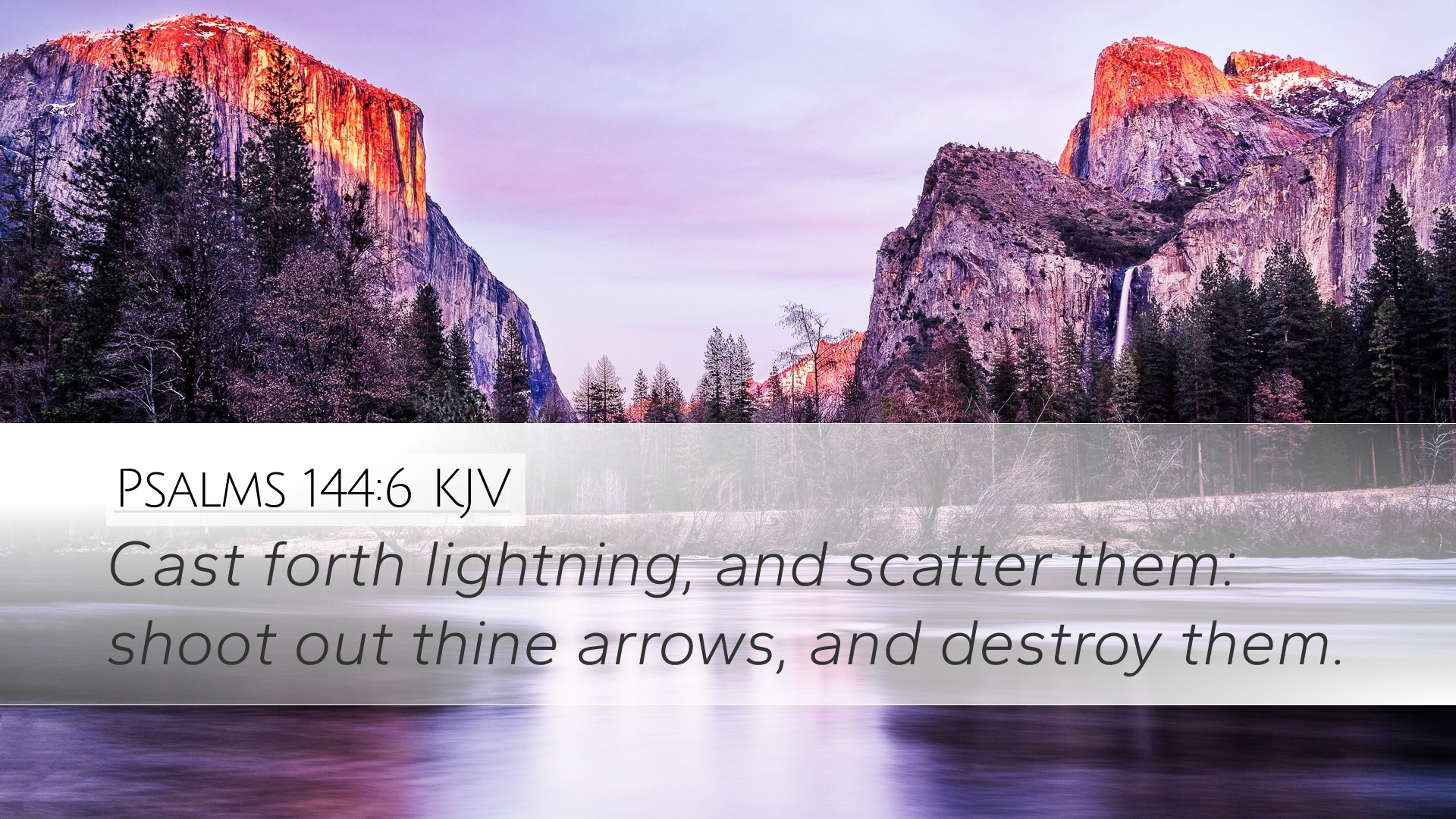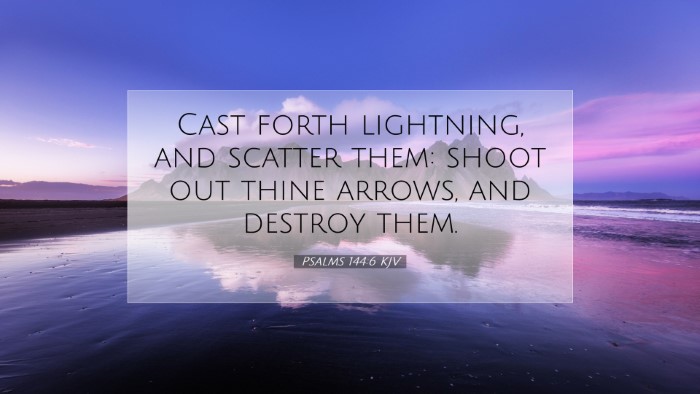Psalms 144:6 Commentary
Psalms 144:6 states: "Cast forth lightning, and scatter them: shoot out thine arrows, and destroy them." This verse portrays a powerful image of divine intervention in the assault against the enemies of the psalmist. The urgency and intensity of the plea indicate a deep reliance on God's might to deliver and protect His people.
Context and Structure
This verse occurs within a psalm attributed to David, reflecting a warrior’s heart in a prayer for victory and deliverance. The psalm can be understood as a blend of praise and supplication wherein David exhorts God to employ His full power in behalf of His chosen ones.
Historical Background
The context of David’s life during this psalm encompasses both his roles as a military leader and a spiritual figure. His recurring conflicts with enemies, such as the Philistines, necessitated a profound trust in God’s sovereignty and power. Understanding this historical backdrop enhances the comprehension of David's plea for divine action against adversaries.
Thematic Elements
This verse serves several key thematic purposes:
- Invocation of Divine Power: The imagery of lightning and arrows emphasizes God's ultimate control over nature and warfare. David draws upon these symbols to illustrate the intensity of God's force.
- Symbolism of Warfare: The use of military imagery also points to the spiritual battles believers encounter, suggesting that divine assistance is paramount for securing victory.
- Assurance of Protection: The plea for destruction of enemies indicates a longing for security and peace for the nation, highlighting God’s role as protector.
Commentary Insights
Matthew Henry's Commentary
Matthew Henry provides a robust reflection on the psalm, emphasizing the necessity of relying on God's power in weak and tumultuous times. He notes that the psalmist isn’t merely asking for physical deliverance but seeks a profound demonstration of God’s sovereignty over all hostile forces. Henry indicates that the request for divine missiles—arrows and lightning—symbolizes the sudden and effective means by which God can scatter the enemy forces.
Albert Barnes' Notes
Albert Barnes stresses the confidence expressed in this verse. He interprets the act of casting forth lightning as God’s potent display of might and a direct reflection of the manner in which God deals with the unrighteous. Barnes articulates that this metaphorical language serves not only to depict the destruction of the enemies but also establishes God's majesty and supremacy in all matters of justice and righteousness. The arrows are seen as tools of judgment that can swiftly reach the hearts of adversaries.
Adam Clarke's Commentary
Adam Clarke elaborates on the poetic nature of this imagery, suggesting that David’s request for God to 'shoot out' His arrows illustrates the need for Divine intervention that is both strategic and effective. Clarke emphasizes that such requests signify a deep acknowledgment of human inability in confronting formidable foes. God’s intervention is portrayed as essential for the victory of His people, thus reaffirming the covenantal relationship between God and Israel.
Theological Implications
This passage brings forth various theological reflections vital for pastoral care, theological studies, and personal spirituality:
- The Nature of God: The portrayal of God as a warrior capable of wielding nature’s forces resonates deeply with the concept of God as both Creator and Redeemer. It underscores the belief that God is intimately involved in the affairs of humanity.
- Human Dependence on God: The acknowledgment of human frailty in the face of adversity promotes a sense of humility and dependence on divine assistance. The faithful are encouraged to call upon God in their trials.
- Spiritual Warfare: The invocation of lightning and arrows serves as an allegory for spiritual warfare, emphasizing the need for believers to remain vigilant and reliant on God’s power against unseen adversaries.
Conclusion
Psalms 144:6 serves as a poignant reminder of the strength found in placing trust in God's capability to intervene in times of crisis. The comments from Matthew Henry, Albert Barnes, and Adam Clarke provide a rich exposition of the text, illustrating the multifaceted dimensions of divine assistance. For pastors, scholars, and students alike, this verse encapsulates themes of reliance, divine sovereignty, and the assurance of protection in the life of faith. Thus, it encourages a deeper understanding of God’s character and His willingness to act on behalf of His people.


